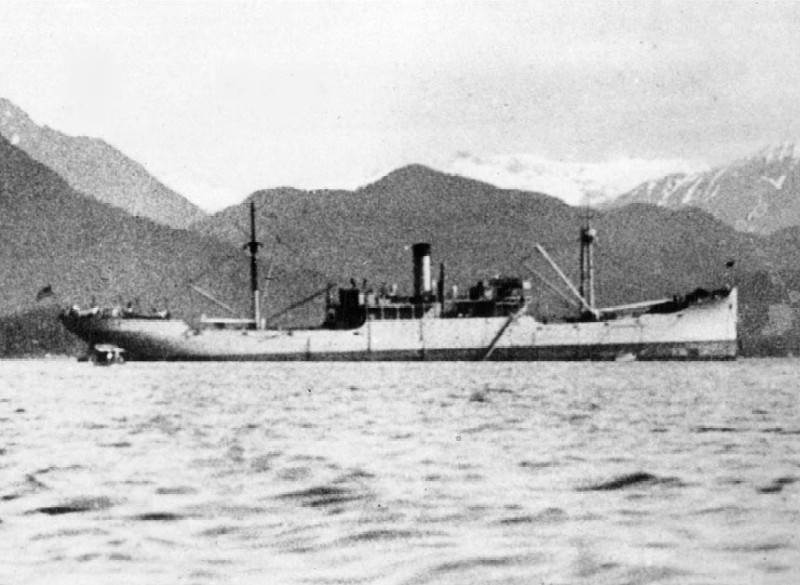The world in 1948 was awash in a sea of scrap metal left over from World War II, and to ship breakers cutting up the old USS Gold Star she was just another piece of leaky iron monger which had outlived its usefulness.
Even when launched in 1919, she was nearly obsolete; her old-fashioned coal-fired boilers and triple expansion engine could hardly push the ungraceful 491-foot freighter faster than 11 knots. Still, for three decades USS Gold Star dutifully delivered general cargo for the Navy and became a familiar sight in the far-flung ports of the western Pacific. Before the war, she made frequent voyages to Guam, China, Alaska, and points in between. With a colorless mission and a crew beset with boredom, the Gold Star easily could have supplied the inspiration for the USS Reluctant featured in the novel Mister Roberts, which sailed “from apathy to tedium with occasional side trips to monotony and ennui.”
Beyond hauling toothpaste and toilet paper, however, the freighter had another mission. Unbeknownst to all but her captain and three or four of her crew, the USS Gold Star served as a signals collection station. From the 1920s until December 1941, the ship’s radio shack was a hive of activity. When her radiomen were not processing their normal traffic, which was minimal, they spent their hours copying Japanese naval and commercial maritime transmissions. The specially trained Navy operators, drawn from the ranks of the “On The-Roof-Gang,” maintained thousands of pages of meticulous records, which they forwarded to OP-20G in Washington. The USS Gold Star, in short, was another kind of workhouse that greatly contributed to our understanding of Japanese naval activities and cipher systems.
Following Pearl Harbor, her secret mission was transferred to other facilities, and for the remained of the war, she continued her important but unexciting duties. By the time hostilities ended the worn-out USS Gold Star had earned one battle star and five other decorations. No mention was ever made nor was any recognition ever granted for her important cryptologic activities.
In the end, she made a solid contribution to winning the war in the Pacific.
Source: NSA.gov


9 March 2020 at 10:33
Loved this story which I had no knowledge of like almost everything you post. Thank you.
LikeLike
9 March 2020 at 11:47
Great story and a ‘first heard’ for me. Keep up the great history of our crypto logic past. Cheers, David
Sent from my iPad
>
LikeLike
9 March 2020 at 15:32
A very interesting of something I’d never heard nor read elsewhere. Thanks a million, Mario!
Jim King
LikeLike
9 March 2020 at 20:01
I had never heard of this ship, or even wondered what else such unassuming vessels might be doing. thanks.
LikeLike
10 March 2020 at 22:25
Interesting and informative article, Mario. Thank you very much! I see the photo you used of GOLD STAR is from the Dictionary of American Naval Fighting Ships, Volume III, 1968, p. 114.
GOLD STAR’s commanding officer in 1941 was Joseph U. Lademan, jr. Lademan was one of the three technical advisers in the making of the movie The Gallant Hours in 1960. Years earlier, in 1924-1925, Lademan served as gunnery officer aboard USS MERVINE under then Lieutenant Commander Richmond Kelly Turner.
On 6 October 1941 Lademan wrote to Turner while the latter was Director, War Plans Division in the Navy Department. Briefly quoting Lademan’s letter: “You may say that it is planned to let Guam go. If so, why put in all the money? Are we not now in the position of building up and improving the harbor for somebody else [i.e. Japan] to use if he so chooses?”
Perhaps aided by the intercept operators aboard GOLD STAR, Lademan and his ship escaped Guam shortly before the outbreak of the Pacific War. GOLD STAR was coaling at Malangas, Philippine Islands on 7 December 1941 (U.S. date).]
Lademan graduated in the Naval Academy’s class of 1920. Two of his classmates, Roscoe F. Good and Maurice E. Curts, were attached to Admiral Kimmel’s CinCPac staff in 1941. Curts was the staff communications officer.
As always, Mario, thank you very much for the fabulous work you do with Station HYPO!
Kindest regards to all of you who serve our country so well in the field of communications intelligence. Andy McKane, 1224 (IT), Maunaloa, Molokai, Hawaii.
LikeLike
28 November 2020 at 00:56
My great uncle was on her in the early 1920’s. I’m looking for a roster to see if he shows up. I haven’t a clue what his rate was – much less if he may have been a SIGINT-er. Best to contact me at ” guhor88@gmail.com ”
thanks
LikeLike
3 January 2021 at 22:42
My father served on the Gold Star during World war II, from 4/9/1944 thru 11/28/1945. He was a Gunners Mate, Second Class (GM2). I have scoured many websites for info on this ship. I am building a family history to pass on to my children and grand children. This info is very interesting. Thanks for contributing.
LikeLike
3 January 2021 at 23:58
Glad to contribute! Sincerely, Mario Vulcano
LikeLiked by 1 person